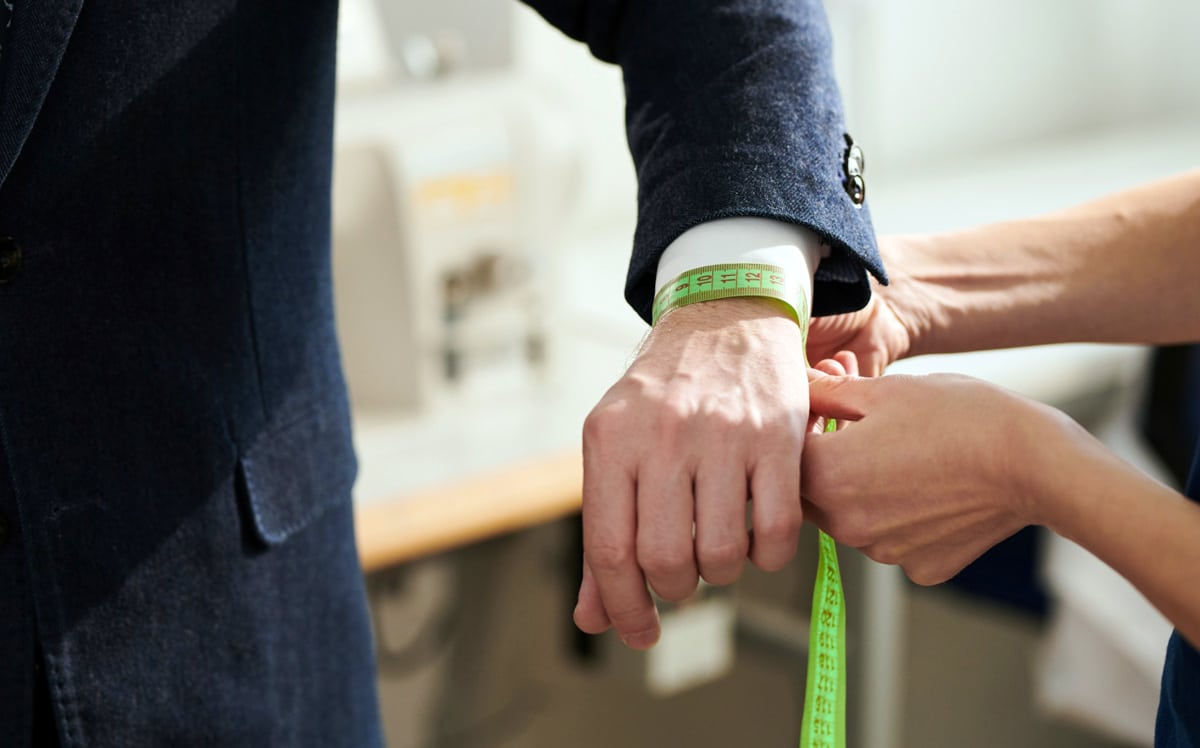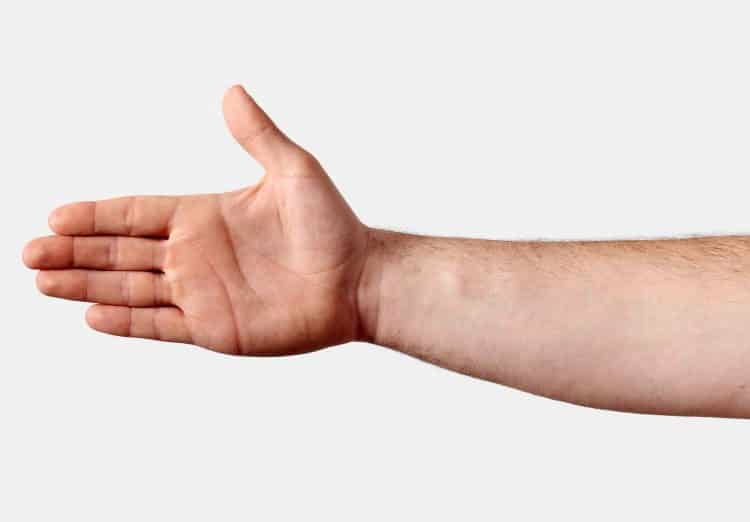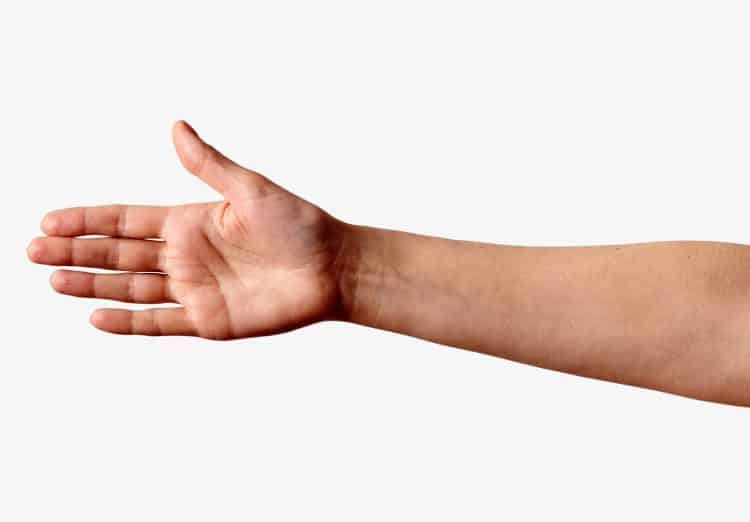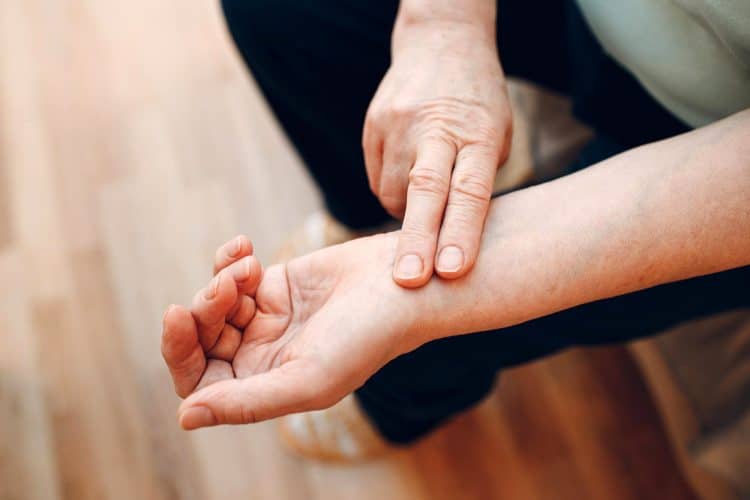Your wrist size is more important than you might think; knowing your wrist size can save you hundreds of dollars. If you’ve ever bought a watch online, you’d know that the first thing they ask you for is your wrist size. Besides your wrist circumference, you must know your wrist diameter to pick the perfect watch case.
Guess your wrist size, and there is a high probability that you’ll end up with an ill-fitting watch that has no charm and strangles your arm like a python.
Besides helping you in your shopping endeavors, your wrist size can significantly affect your overall health and fitness. A person with small wrists probably has a lower bone density, increasing his risk of fractures and injuries.
Generally, men have bigger wrists than their female counterparts; it is mainly because of differences in body size and muscle mass. It, however, doesn’t mean that men always have bigger wrists than ladies. Your wrist size can vary depending on age, height, weight, body composition, and genetics.
In this article, we go over the average wrist size for males and females, how to measure your wrist size accurately, the factors affecting your wrist size, and the implications of your wrist size.
Knowing your wrist size and diameter will make you look like someone who knows what they are talking about the next time you walk into any jewelry store or watch shop. So, without any further ado, let’s get into the average wrist size for males and females.
Why You Should Know the Average Wrist Size For Males and Females

Knowing your wrist circumference before buying a watch or a bracelet ensures a proper fit. Furthermore, learning about the average wrist size for males and females will help you analyze how you stack up against your peers.
The wrist size is a lot more important than what most people give it credit for. For example, your body frame can depend on your wrist size.
The wrist size is also widely used as anthropological reference data in many surveys, as it can provide valuable insights into your health and wellness.
Most people grow up believing that they have awfully thin wrists. However, these assumptions fade away as soon as they learn about the average wrist size for their group, helping boost self-confidence.
What is the average wrist size for males and females?
Based on the anthropometric data from the U.S. Army Natick Soldier Systems Center published in 2017, the average male wrist size is 6.77 inches (17.2 cm). Additionally, studies have found that the average wrist size for women falls between 5.5 inches and 6.5 inches (13.97 cm to 16.51 cm). Keep in mind that wrist size can vary due to factors like genetics, age, and physical activity, so it’s essential to measure your wrist for an accurate fit when selecting accessories such as bracelets or fitness trackers.
Average Wrist Size For Males
According to anthropometric data published by the U.S. Army Natick Soldier Systems Center in 2017, the average male wrist size is 6.77 inches (17.2 cm). [1]
Different studies conducted over the years have shown that the average male wrist size measures just under 7 inches in circumference. [2]
Your wrist size depends on your age, gender, body type, height, genetics, and composition. Although wrist size can indicate overall body size and composition, it should not be solely relied upon as a complete indicator of health and fitness levels. Later in this article, we will also discuss the implications your wrist size can have on your overall health.
Average Wrist Circumference For Teenage Boys
According to the report compiled by the Census at School, which is run by the Statistical Society of Canada, here is the average wrist size for boys: [3]
| Age | Average Wrist Size (inches) |
| 8 | 5.57 |
| 9 | 5.70 |
| 10 | 5.85 |
| 11 | 5.91 |
| 12 | 6.14 |
| 13 | 6.33 |
| 14 | 6.44 |
| 15 | 6.51 |
| 16 | 6.66 |
| 17 | 6.84 |
| 18 | 6.66 |
The average wrist size for boys undergoes a steady rise with age. Boys at eight have an average wrist of 5.57 inches. It rises to 5.7 inches when they turn nine, 5.85 inches at 10, 5.91 inches at 11, 6.14 inches at 12, 6.33 inches at 13, 6.44 inches at 14, 6.51 inches at 15, and 6.66 inches at 16. The average wrist size for boys tops at 6.84 inches when they turn 17 and sees a minor drop at the age of 18.
Average Wrist Width (Diameter) For Males
Your wrist width measurement comes in handy when you’re on the market for a watch. It helps you choose the correct watch case size for your wrist. You’ve probably seen guys with twig arms rocking a giant wristwatch. It’s no secret that these watches don’t suit their personality.
These fellas could have avoided this blunder only if they had invested some time learning about their wrist diameter. Most watches mention their case diameter on the box. As a rule of thumb, your watch case diameter should be a few millimeters less than your wrist diameter.
As per the US anthropometric data taken from the CDC’s Vital and Health Statistics report, the average male wrist width is 5.9 cm (2.28 inches). This data is based on the wrist breadth measurements of 7,501 men aged 20 and older. [4]
| Age | Wrist Breadth (inches) |
| 20-29 | 2.28 |
| 30-39 | 2.32 |
| 40-49 | 2.32 |
| 50-59 | 2.36 |
| 60-69 | 2.40 |
| 70-79 | 2.40 |
| 80+ | 2.40 |
According to this data, the average wrist diameter in men grows steadily with age. The average wrist width for men in the 20-29 age bracket is 2.28 inches. It increases to 2.32 inches for men between 30 and 49. The average male wrist breadth jumps to 2.36 inches for folks in the 50-59 age bracket before peaking at 2.40 inches for men above 60.
Men’s Wrist Size Chart
We have compiled a convenient chart for folks trying to determine their wrist size. We used different anthropometric research and sizing guides to create this table.
| Size | Wrist Size (inches) |
| Extra Small | <5 |
| Small | 5 – 6.5 |
| Medium | 6.5 – 7.5 |
| Large | 7.5 – 8.5 |
| Extra Large | 8.5 |
Men with a wrist circumference smaller than 5 inches have an “extra small” wrist. Folks with a 5-inch to 6.5-inch wrist are in the “small” group; the “medium” group consists of men with a 6.5-inch to 7.5-inch wrist, and the “large” group includes males with a 7.5-inch to 8.5-inch wrist size. Men with a wrist size of 8.5 inches or bigger fall in the “extra large” category.
Average Wrist Size For Females
According to a study, the average women’s wrist size is between 5.5 inches and 6.5 inches (13.97 cm to 16.51 cm). [5]
Your wrist size is primarily determined by the size of the underlying bones, which can vary significantly from person to person. The wrist size does not necessarily correlate with overall body size or weight. It also depends on your genetics, age, and a few environmental factors.
Average Wrist Circumference For Teenage Girls
According to the Census at School, Statistical Society of Canada report, here is the average wrist size for girls:
| Age | Average Wrist Size (inches) |
| 8 | 5.42 |
| 9 | 5.52 |
| 10 | 5.68 |
| 11 | 5.81 |
| 12 | 5.87 |
| 13 | 5.97 |
| 14 | 6.00 |
| 15 | 6.03 |
| 16 | 6.03 |
| 17 | 6.09 |
| 18 | 5.97 |
Unlike the boys, the average wrist size of the girls does not grow steadily with age. Their wrist circumference rises until the age of 14, after which it, more or less, stagnates. The female wrist circumference, on average, sees a spike when they turn 17 but then sees a significant drop on turning 18.
The average wrist circumference for an eight-year-old girl is 5.42 inches. An average nine-year-old girl has a 5.52-inch wrist circumference; it grows to 5.68 inches for a 10-year-old, 5.81 inches for an 11-year-old, 5.87 inches for a 12-year-old, 5.97 inches for a 13-year-old, 6 inches for a 14-year-old, before stalling at 6.03 inches for a 15 to 16-year-old girl. The average wrist size jumps to 6.09 inches when a girl turns 17 but falls to 5.97 inches when she turns 18.
Average Wrist Width (Diameter) For Females
According to US anthropometric data taken from the CDC’s Vital and Health Statistics report, the average female wrist width is 5.2 cm (2.04 inches). This data is based on the wrist breadth measurements of 8,162 women aged 20 and older.
| Age | Wrist Breadth (inches) |
| 20-29 | 1.96 |
| 30-39 | 2.00 |
| 40-49 | 2.04 |
| 50-59 | 2.08 |
| 60-69 | 2.08 |
| 70-79 | 2.08 |
| 80+ | 2.12 |
The average female wrist width pattern follows a slightly different trajectory than the men. An average lady in the 20-29 age bracket has a 1.96-inch wrist diameter. It increases to 2 inches for women in the 30-39 age range and to 2.04 inches for ladies between 40 and 49. The average wrist width plateaus at 2.08 for women in the 50-59 age bracket. However, it breaks through to 2.12 inches for women above 80.
Women’s Wrist Size Chart
Here is a convenient wrist size chart to assess if you have average, small, or large wrists:
| Size | Wrist Size (inches) |
| Extra Small | 5.5 |
| Small | 5.5 – 6 |
| Medium | 6 – 6.5 |
| Large | 6.5 – 6.75 |
| Extra Large | 7 |
Women with 5.5-inch or smaller wrist diameters fall in the “extra small” category. The “small” division includes women with a 5.5-inch to 6-inch wrist width. Ladies with a 6-inch to 6.5-inch wrist width are in the “medium” category; the “large” group comprises girls with a 6.5-inch to 6.75-inch wrist diameter. Finally, ladies with 7-inch or bigger wrist width are in the “extra large” category.
Notably, these measurements are for women of average height. Short or tall women can have varying wrist diameters, which can be considered normal for their frame size.
How To Measure Your Wrist Size?
You need a tape measure to gauge your wrist circumference. Furthermore, unlike measuring your chest or shoulders, scaling your wrists is more convenient, and you don’t need a partner’s help for it.
There are three ways of measuring your wrists. You could do it with a tape measure, a thread, or using the fingers of your other hand. Each method provides a reliable reading. So, let’s roll up our sleeves and get measuring.
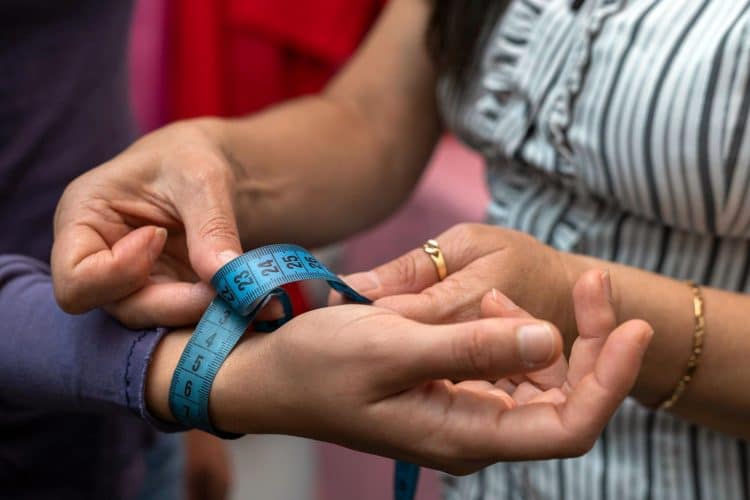
How To Measure Your Wrist With a Tape Measure
Use a tailor’s tape measure for this measurement.
- Hold your palm parallel to the floor.
- Wrap the tape around your wrist just below the wrist bone and the thinnest part of your wrist.
- Spread your fingers.
- Note down the number where the tape overlaps.
- Repeat the process 2-3 times to ensure a correct reading.
- Measure your other wrist.
How To Measure Your Wrist Size With a Thread
Although we recommend using a loose piece of thread for this measurement, you could use anything that can wrap around your wrist, such as paper or a phone’s charging cable.
- Hold your palm parallel to the floor.
- Wrap a thread around your wrist just below your wrist bone.
- Mark where the thread overlaps using a pen or marker.
- Place the threat on a flat surface.
- Measure between the two ends of the thread using a scale.
- Repeat on your other wrist.
How To Measure Your Wrist Size With Your Fingers
If you don’t have access to a tape measure or a thread but want to measure your wrist size, this method is for you. You could use your other hand to check your wrist size. Notably, this method won’t give you wrist measurements in centimeters or inches. It will only give you a rough estimate of your wrist size.
This is how to measure your wrist size with your fingers:
- Hold your palm parallel to the floor.
- Wrap the middle finger and thumb of your right hand around the thinnest part of your left wrist.
You have relatively big wrists if your thumb and finger don’t touch. On the other hand, overlapping fingers indicate a small wrist, and you have average-sized wrists if your index finger and thumb touch slightly.
This method doesn’t account for your hand size; hence, it is the least reliable of the three methods. Use this method to check your wrist size quickly, but don’t rely on it before buying an expensive watch.
Notes About Measuring Your Wrist
Keep the following points in mind while measuring your wrists:
- Make sure the tape measure is taut. However, it should not be so tight that it digs into your skin.
- While using a thread to measure your wrists, you’ll need someone to mark the ends while you hold them in place.
- Avoid clenching your fist while taking your wrist measurement.
- Besides your wrist size, you should also know about your wrist diameter.
Measure Your Wrist Diameter
The most-iconic tech company in the world, Apple Inc., offers its smartwatches in two sizes — 41mm and 45mm. Each watch comes with a band that you can adjust to fit your wrist size. However, buying the incorrect watch case size can be a costly mistake.
Case in point, knowing your wrist size is not enough when buying an expensive watch. You must also know your wrist diameter.
Your wrist diameter involves measuring your wrist from one end to the other. You should take this measurement from just about where you’ll wear your watch. You don’t need to take your wrist diameter measurement on both sides of your hand.
This is how to measure your wrist width:
- Hold your palm parallel to the floor and spread your fingers.
- Place one end of the tape measure on one end of your wrist.
- Note down the number on the other end of the wrist.
We recommend using a tape measure for this method, especially if you are taking your wrist width for a watch.
Factors Affecting Wrist Size
Wrist size among individuals can vary significantly depending on the following factors:
Age
An individual’s wrist size changes with age. As seen in the tables above, wrist size for men and women grows gradually with age. Conversely, some people might experience wrist size reduction due to muscle atrophy, which is a natural part of the aging process. Aging also leads to the weakening of bones and joints.
Genetics
Genetics plays a crucial role in determining your wrist size because of their part in ascertaining your bone density and size. Some people are naturally predisposed to have bigger and stronger wrists than their counterparts due to their genetic makeup.
Gender and Hormonal Balance
Males tend to have bigger wrists than ladies. The male sex hormone, testosterone, promotes bone and muscle growth in males, leading to larger wrist sizes in men. Women do not produce the same amount of testosterone as men to build the same amount of muscle mass.
Ethnicity
Studies have shown that body structures can vary between ethnicities. For example, Asian men generally have smaller wrists than people of European descent. [6]
Body Composition
Your height and weight also play a vital role in your wrist size. Heavier and taller folks are more likely to have bigger wrists than their lighter and shorter counterparts. People with larger bones, joints, and muscles need to support more weight and require more stability, leading to increased wrist size.
Wrist Size Implications
Contrary to what most people believe, your wrist size can help you do more than find the right watch. Here are the implications of wrist size on your overall health:
Wrist Size and Body Type
Your wrist size can dictate your body type and vice-versa. Folks with larger wrists generally have larger body frames and carry more muscle mass. Learning about your body type can help you choose an effective diet and training plan.
Wrist Size in Sports and Athletic Performance
Your wrist size can play a crucial role in your athletic performance, especially in sports that require throwing strength, such as basketball, baseball, rugby, cricket, tennis, weightlifting, and boxing. Folks with larger wrists are at a natural advantage in these sports, as bigger wrists can generate more force and allow for greater stability.
Wrist Size in Bodybuilding

In strength sports, bigger wrists can result in a better grip on the barbells and dumbbells, leading to bigger and more efficient lifts. Lifters with smaller wrists are at a disadvantage and are at a higher risk of injury, especially while lifting heavy.
Furthermore, the Grecian ideal calculator uses your wrist size to determine your ideal body measurements. The Grecian ideal was formulated by Eugen Sandow, also known as the “Father of Modern Bodybuilding.” The Grecian ideal calculator was used by bodybuilding legends, such as Steve Reeves, Reg Park, Arnold Schwarzenegger, Frank Zane, Lee Labrada, and Serge Nubret, to carve their iconic physiques.
Small joints are considered ideal in bodybuilding as they give an illusion of bigger muscle bellies. For example, small wrists and elbow joints can make your biceps and forearms look huge, whereas small knee and ankle joints can create the illusion of a bigger lower body.
Wrist Size in Medical Diagnosis
Wrist size can be an indicator of bone density and overall bone health. Folks with smaller wrists are considered to be at a higher risk of developing osteoporosis, a condition characterized by decreased bone mass and an increased risk of fractures.
Furthermore, your wrist size can be used as a factor in diagnosing carpal tunnel syndrome, which is a condition that causes numbness, tingling, and weakness in the hand and wrist. Individuals with smaller wrists are at a greater risk of developing carpal tunnel syndrome because they are more susceptible to wrist nerve compression and irritation.
Notably, wrist size alone is not a conclusive indicator of overall health or fitness levels. Other factors such as diet, exercise, and lifestyle should also be weighed when evaluating your health and fitness status.
FAQs
Is it possible to grow wrist size with exercise?
Although most of us would like to have bigger wrists, you cannot grow your wrist size through exercise, as they don’t contain large skeletal muscles. They mostly consist of tendons and sinewy flexors, and extensor muscles and cannot grow bigger.
How does your wrist size affect your body frame?
Your wrist size can be an indicator of your body frame. People with larger wrists tend to have a larger body frame, allowing them to carry more muscle mass.
What is the average female wrist size by height?
There is no scientific evidence to prove the correlation between height and wrist size. Women of average height typically have an average wrist size ranging from 5.5 inches to 6.5 inches. It’s worth noting that wrist size tends to increase with height.
Also Check Out:
- Average Biceps Size: How Do You Measure Up?
- Average Forearm Size For Men and Women
- Average Thigh Circumference in Males and Females
- Average Calf Size for Men and Women
- Average Ankle Size For Men and Women
- Average Waist Size For Women and Men
- Average Neck Size For Males and Females
- Average Chest Size For Men & How to Measure Your Chest
- Average Butt Size For Women and Men
Wrapping Up
Knowing your wrist size can save you time, money, and frustration when shopping for bracelets, watches, and other wristwear. Knowing your wrist size also separates the watch enthusiasts and accessory connoisseurs from the wannabes.
Besides nailing your fashion statement, knowing the average wrist size for males and females can also reveal important details about your overall health. Now that you’ve got the low-down on the average wrist sizes, grab a measuring tape, wrap it around your wrist, and share your findings in the comments below.
References
Fitness Volt is committed to providing our readers with science-based information. We use only credible and peer-reviewed sources to support the information we share in our articles.
- Mitchell, K. B., Choi, H. J., & Garlie, T. N. (2017). Anthropometry And Range Of Motion Of The Encumbered Soldier. U.S. Army Natick Soldier Research, Development, and Engineering Center. https://apps.dtic.mil/sti/pdfs/AD1028746.pdf
- McDowell MA, Fryar CD, Ogden CL. Anthropometric reference data for children and adults: United States, 1988–1994. National Center for Health Statistics. Vital Health Stat 11(249). 2009
- Average wrist size. (2018). Https://Forum.Tz-Uk.Com. https://forum.tz-uk.com/showthread.php?416517-Average-wrist-size
- Average wrist circumference by age. (2012, July 11). Census at School | Recensement à l’école. https://censusatschool.ca/data-results/2006-07/wrist-circumference/
- MedlinePlus. (2020). Calculating body frame size. https://medlineplus.gov/ency/imagepages/17182.htm
- McFadden D, Bracht MS. Sex and race differences in the relative lengths of metacarpals and metatarsals in human skeletons. Early Hum Dev. 2009 Feb;85(2):117-24. doi: 10.1016/j.earlhumdev.2008.07.001. Epub 2008 Sep 11. PMID: 18789613; PMCID: PMC2649659.
Tip: If you're signed in to Google, tap Follow.


